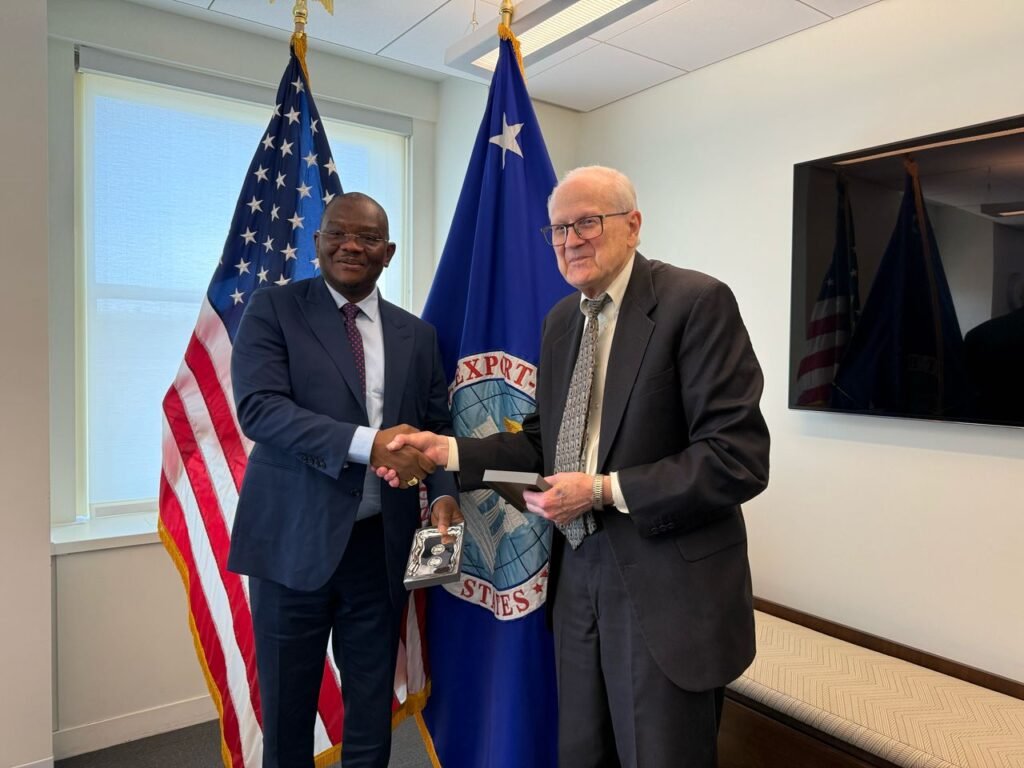Hot!
Richard Brandt: The ‘techpreneur’ helping young people “rise digitally”

Mr Richard Brandt is the Chief Executive Officer of Codetrain, a software educational company which equips trainees with computer literacy skills, such as coding, to enable them offer solutions through web and mobile applications.
Since 2017, he has combined his teaching experience, software knowledge, and international exposure to positively impact hundreds of students who enroll on various programmes offered by the institution.
From humble beginnings and with limited resources, Richard is still determined to make Codetrain an “agent of enlightenment” to help young people tap the opportunities available in the digital space.

Plan
Although software development was not part of his initial career plan, the ‘techpreneur’ who hails from Osu in the Greater Accra Region said he always wanted to “improve things” hence his focus on projects that would lead to the advancement of society.
“While growing up, I used to accompany my father during polio immunisation in communities and that was when I realised the need to create more opportunities for the less privileged,” he told The Spectator during an interaction to find out more about him and his plans for the youth.
Richard studied General Science at Ghana Lebanon Islamic Secondary School in Accra before proceeding to Kwame Nkrumah University of Science and Technology (KNUST) where he graduated with Bachelor of Science (BSc) Mathematics in 2009.
Passion
With his arithmetic background, he was interested in the financial or insurance sector but that did not materialise. He progressed to achieve positive results from other opportunities that came his way and he has left a mark anywhere he has found himself.
“After completing school, my colleague and I had identified the falling standards in Mathematics results among BECE candidates within my area. Following the approval by school authorities, we decided to offer free Mathematics lessons for the pupils and that year they recorded high marks in the final exams,” he recalled.
The 31-year-old said his passion for Information Communication Techonology (ICT) was brought to the fore when he contributed to the establishment of an ICT department at the Ga East Municipal Assembly, as part of his National Service.
After the service, he joined Meltwater Entrepreneurial School of Technology (MEST) in 2010 where he studied software development and entrepreneurship.
Progress
During the two-year programme, he was part of a team that won the World Youth Summit Award for an innovation meant to address maternal mortality in developing countries.
A year later, he was selected among 100 best innovators worldwide for another eight-month programme called “Start Up Chile”, which trained entrepreneurs to advance their ICT skills and to start their own companies.
“During this period, I realised many people who joined the programme were no different from the young Ghanaians in my country. I realised there were young people in Ghana who could do same but did not have the needed opportunity,” Mr. Brandt noted.
The CEO said there was a high demand for software application developers in Chile therefore, upon his return to Ghana in 2015, he started a consulting company which connected young Ghanaians with software developers abroad.
“I took on interns and trained them. In 2017 I made a difficult decision to stop the consultancy and rather establish an institution to train young people to get better.
“It has been very challenging to start from the scratch without any support. Three years on, we have been able to train about 600 youth including some who had no prior knowledge in ICT,” he said.
Reputation
According to him, though the institution was “doing a great job”, it took time to gain its reputation. A number of local and international students later became ambassadors of the institution.
“We don’t only train application developers but teach trainees critical thinking and all the skills that are required for them to make an impact in whichever organisation they find themselves,” he added.
In 2018, Codetrain enrolled on ‘Enpact Start Up’ mentoring programme which contributed to the restructuring of the institution. Apart from training sessions, the organisation hosts pep talks in secondary and tertiary institutions to whip up the interest of students in the use of modern technology tools.
The Technology enthusiast maintained that young people must be trained to “rise digitally” and become global leaders who transform companies and society as a whole.
Recognition
About two weeks ago, nine of his trainees came up with different applications aimed at dealing with the challenges of COVID-19. Others, he said, had also been absorbed by some local companies to provide tailored solutions.
“We have been able to prove that our concept works and we are hoping to train more young people in the years ahead. The future of Codetrain is to become an agent of development and make the youth ready for the future,” Mr. Brandt said.
Having started from an apartment, he currently has a team of 10 working at the Accra and Kumasi offices of the company and hopes to expand across the country and has called for partnership from public and private entities.
In 2019, Richard was listed among the top 50 Most Influential Young Ghanaians by Avance Media, a Public Relations and Rating firm. He was again adjudged ICT Entrepreneur of the Year 2019 at the YEIS 2019 Awards.
By Ernest Nutsugah
Hot!
GEXIM deepens relations with US EXIM Bank

A management team of the Ghana Export – Import Bank (GEXIM) led by the Acting Chief Executive, Sylvester Mensah met with the leadership of the Export–Import Bank of the United States (US EXIM) on Wednesday April 23, 2025 in Washington DC, United States of America.
The Acting President and Chairman of US EXIM, Mr. James C. Cruse and Vice President, International Relations, Ms. Isabel Galdiz received the GEXIM delegation, which included Deputy CEO for Banking, Mr. Moses Klu Mensah and Head of International Cooperation, Mr. Jonathan Christopher Koney at the headquarters of US EXIM.

The meeting offered the GEXIM team the opportunity to share the strategic direction of the Bank in line with the resetting agenda of the President of the Republic, His Excellency John Dramani Mahama for the repositioning of the Ghanaian economy into an export-led one by providing the requisite investment to Ghanaian businesses.
Mr. James C. Cruse expressed US EXIM’s eagerness to deepen its existing relations with GEXIM and proposed the signing of a new Cooperative Framework Agreement following the expiration of a Memorandum of Understanding signed in 2019 to utilize US EXIM’s medium term loan guarantees to procure machinery by GEXIM for qualified Ghanaian Small and Medium-sized Enterprises (SMEs).
Mr.Sylvester Mensah thanked the Acting President and Chairman of US EXIM for hosting the GEXIM delegation and reaffirmed the Ghanaian government’s commitment to strengthening trade and investment between Ghana and its global partners for economic transformation of Ghana with GEXIM playing a pivotal role.
The two teams will be meeting on the sidelines of the 2025 US EXIM Annual Conference on 29th and April 30, 2025 to explore possible areas of collaboration and matching Ghanaian businesses to American companies. The meeting ended with an exchange of gifts.
Hot!
Many SOEs have been used as mere instruments for personal wealth accumulation –Pres.Mahama

President John Dramani Mahama has expressed concern over the misuse of State-Owned Enterprises (SOEs) for personal financial gain by individuals in leadership positions.
Speaking during a meeting with Chief Executives of specified entities under the State Interest and Governance Authority (SIGA) on Thursday, March 13, the President directly attributed the dire state of SOEs to their leadership, accusing chief executives, management teams, and governing boards of prioritising personal enrichment over organisational efficiency.
He pointed to bloated budgets, unjustified allowances, and unnecessary expenditures as factors draining public funds while SOEs continue to rely on government bailouts.
“Many SOEs have been used as mere instruments for personal wealth accumulation by appointees. The chief executives, management, and boards of these enterprises are responsible for this situation. Some SOEs have become perennial loss-makers, draining public funds with bloated budgets, unjustified allowances, and unnecessary expenditures while relying on government bailouts as if entitled to them. Many of these entities are at their lowest point in the entire history of the Fourth Republic,” he said.
President Mahama further noted that many SOEs have been plagued by inefficiencies, corruption, and mismanagement, leading to consistent financial losses. He cited the 2023 State Ownership Report by the State Interests and Governance Authority (SIGA), which highlighted systemic inefficiencies and wasteful expenditures within these entities.
He therefore reaffirmed his commitment to reforming under-performing SOEs and ensuring they serve national interests.
He warned that loss-making SOEs will no longer be tolerated and will either be merged, privatised, or closed.
“I will assess you based on your performance. If you do not align with the pace of the reset agenda, you may be asked to step aside. If that adds to the horror movie, so be it,” he added.
Source: Myjoyonline.com







